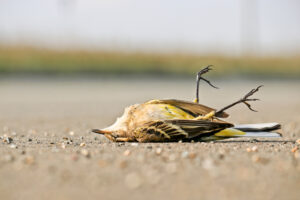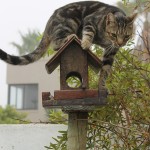“Understanding the connections of human, animal, and environmental health is essential in addressing the threat of avian flu. The One Health approach emphasizes the collaborative efforts of veterinarians, public health professionals, and the community to prevent and control infectious diseases affecting animals and humans.”
One Health: Avian Flu, the Risk to Domestic Cats and their Human Communities
In recent years, the global concern over avian flu, also known as bird flu, has intensified due to its potential impact on both human and animal health. While much attention has been focused on the transmission of avian flu from birds to humans, a lesser-known aspect of this threat involves domestic cats. In this article, we consider the connection between avian flu and our feline companions.
Avian flu is a contagious viral infection that primarily affects birds, including wild birds and poultry. The virus responsible for avian flu, influenza A (H5N1), can mutate and pose a risk to other animals and humans. The transmission usually occurs through direct contact with infected birds or their droppings.

Recent studies have shed light on the ability of domestic cats to contract and spread avian flu. In some cases, cats have been found to be infected with the H5N1 virus after coming into contact with sick birds or their contaminated environments. This raises concerns about the role domestic cats might play in the transmission of avian flu within households and communities.

Cats can contract avian flu through various means, such as hunting and consuming infected birds or by being exposed to contaminated surfaces and objects. The virus can survive on surfaces for extended periods, creating a potential source of infection for curious felines.
Avian flu can have severe health implications for domestic cats. Infected cats may exhibit symptoms such as respiratory distress, lethargy, and loss of appetite. In some cases, the infection can be fatal. Cat owners should be vigilant and seek immediate veterinary attention if their pets show any signs of illness, especially if they suspect exposure to sick birds.
Cat Owners: Keep cats indoors, away from wild birds. If cats are normally allowed to roam outdoors, keep cats indoors during Avian Flu outbreaks. Discourage hunting behaviour, and avoid feeding cats raw or undercooked poultry. Regular veterinary check-ups are crucial for monitoring cat health and detecting infections early on.
Bird Enthusiasts: Keep all bird feeding, watering, and bathing areas clean, disinfecting regularly with a solution of hot water, soap, and bleach. Consider removing these facilities during severe outbreaks.
Poultry Keepers: Backyard hens, ducks, and other poultry should be monitored daily and shielded from contact with wild birds by confining them in a wire-enclosed run or similar.
As we explore the complexities of global health concerns, it’s crucial to recognize the role domestic cats can play in transmitting avian flu. By staying informed, taking preventive measures, and adopting a One Health approach, we can contribute to the well-being of our feline companions, wild birds, farms and ourselves.
Resources:
‘Low risk’ for humans, as cats in Poland test positive for avian influenza. United Nations. (2023, July). UN News. https://news.un.org/en/story/2023/07/1138762
Centers for Disease Control and Prevention. (n.d.). Avian Influenza (Bird Flu) in Other Animals. https://www.cdc.gov/flu/avianflu/avian-in-other-animals.htm
Government of Canada. (n.d.). Avian Influenza (Bird Flu) – Animals Susceptible to H5N1 HPAI. https://inspection.canada.ca/animal-health/terrestrial-animals/diseases/reportable/avian-influenza/animals-susceptible-to-h5n1-hpai/eng/1375992449648/1375992451039
Q&A: Avian Influenza in Cats. World Organization for Animal Health. https://www.woah.org/app/uploads/2023/07/qa-avian-influenza-in-cats.pdf





